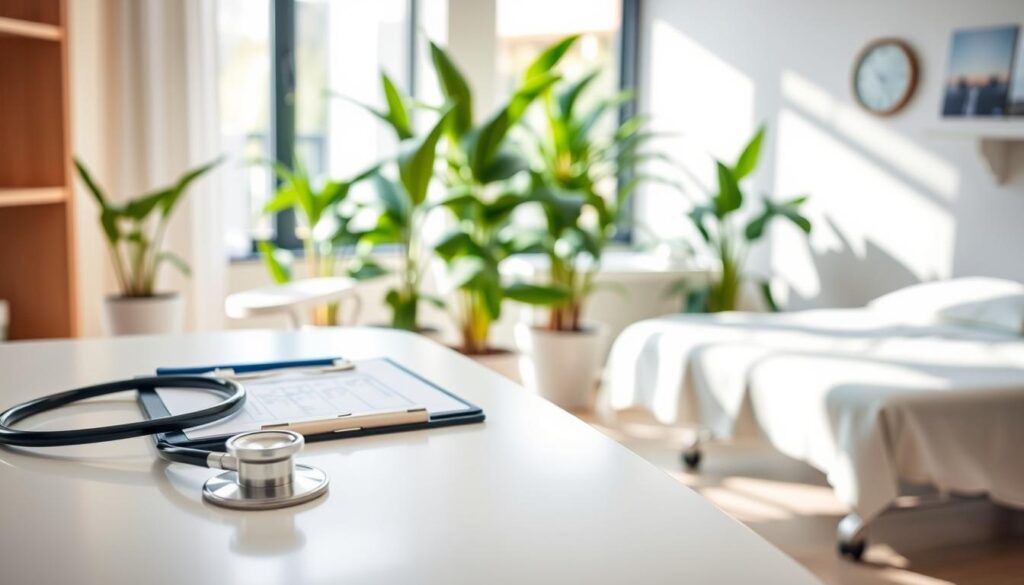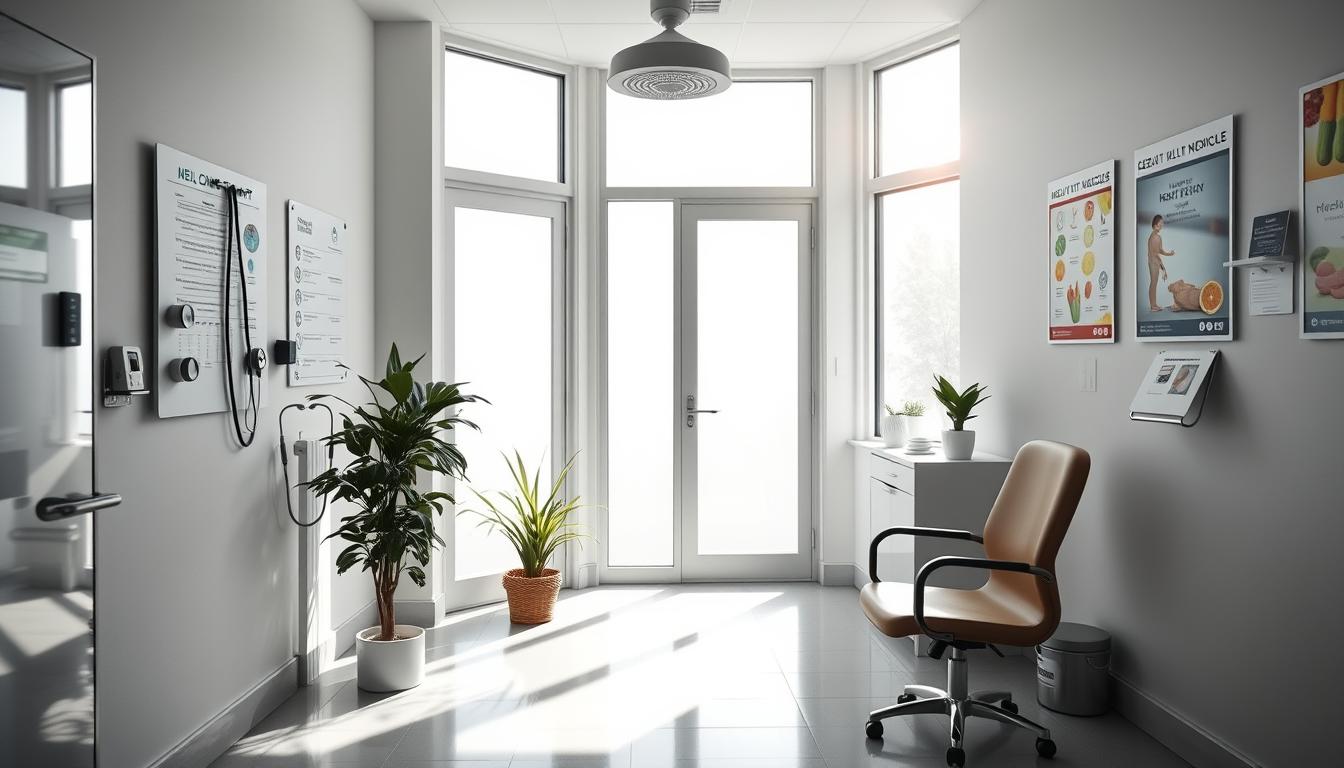Good health is a top priority for everyone, and regular medical check-ups are key. These routine exams help find health issues early. By being proactive, we can catch problems before they get worse.
Check-ups let doctors keep an eye on our health. They help spot changes and offer advice on staying healthy. These exams are all about helping us take charge of our health. They make our lives better and save us money and stress in the long run.
Key Takeaways
- Regular medical check-ups are essential for maintaining good health and identifying potential health issues early on.
- Preventive healthcare through routine examinations empowers individuals to take control of their well-being.
- Early detection of underlying conditions can lead to more effective treatment and better long-term outcomes.
- Consistent check-ups help healthcare providers monitor changes in an individual’s health over time.
- Embracing the importance of regular check-ups can lead to a healthier, more fulfilling life.
Understanding Regular Health Check-Ups: Definition and Basics
Regular health check-ups are key to preventive healthcare. They help keep you healthy and catch health problems early. This leads to many benefits of routine health check-ups and advantages of regular check-ups. Knowing what check-ups are, who needs them, and what they cover helps you stay healthy.
Types of Regular Medical Examinations
There are many types of health check-ups. These include:
- Annual physical exams
- Routine screenings for conditions like cancer, heart disease, and diabetes
- Immunizations and vaccinations
- Dental cleanings and oral health assessments
- Vision and hearing tests
Who Needs Regular Check-Ups?
How often you need check-ups depends on your age, gender, and health. But, most doctors say everyone should get regular check-ups. This helps catch and fix problems early.
Components of a Standard Health Check-Up
A standard health check-up includes several parts. These are:
| Component | Purpose |
|---|---|
| Physical Examination | Checks your overall health, including vital signs, weight, and BMI |
| Laboratory Tests | Looks at blood, urine, and other samples for diseases or health issues |
| Screenings | Finds early signs of diseases like cancer, heart disease, and mental health problems |
| Counseling and Education | Gives advice on staying healthy and managing health concerns |
Understanding the value of health check-ups helps you stay healthy. It’s a step towards a better future.
“Regular health check-ups are the foundation of preventive healthcare, empowering individuals to take charge of their well-being and maintain optimal health.”
The Importance of Regular Check-Ups in Disease Prevention
Regular health check-ups are key to keeping you healthy. They help find diseases early. This means you can get treatment sooner and have a better chance of getting well.
One big plus of regular medical screenings is finding health problems early. Diseases like cancer, heart disease, and diabetes are easier to manage if caught early. Doctors can do full exams, order tests, and spot problems before they get worse.
Routine check-ups improve overall health by helping you stay ahead of health issues. They let you and your doctor keep an eye on your health. This can lead to better health in the long run and save money on healthcare costs.
| Routine Screening Benefits | Potential Early Detection |
|---|---|
| Cancer | Breast, Cervical, Prostate, Colorectal |
| Cardiovascular Disease | High Blood Pressure, High Cholesterol |
| Diabetes | Prediabetes, Type 2 Diabetes |
| Osteoporosis | Bone Density Loss |
By valuing regular check-ups, you can protect your health. Early detection through screenings can greatly improve treatment results and improve your life quality.
“Regular check-ups are the key to unlocking the door to a healthier future. They empower us to take control of our health and make informed decisions that can positively impact our lives.”

Early Detection: How Regular Screenings Save Lives
Regular health check-ups are key to finding diseases early. This allows for quick action and better health results. By getting routine screenings, people can spot serious conditions early. This is when treatment works best.
Common Health Issues Detected Through Regular Screenings
Regular check-ups can find many health problems early. This includes cancer, heart disease, diabetes, and thyroid issues. Some common conditions found are:
- Breast cancer through mammograms
- Colorectal cancer through colonoscopies
- Prostate cancer through PSA tests
- Cardiovascular disease through cholesterol and blood pressure screenings
- Type 2 diabetes through blood glucose tests
Success Stories and Statistics
Many success stories highlight the value of regular check-ups. Early detection greatly improves treatment success and survival rates. For instance, early-stage breast cancer has a 90% 5-year survival rate. This drops to 22% for late-stage diagnosis.
Modern Screening Technologies and Methods
New medical technologies have changed preventive care. Screenings are now more accurate, easy to get, and convenient. Tools like 3D mammography and liquid biopsies help people stay proactive about their health.
By getting regular health check-ups, people can take a big step towards better health. Don’t wait until it’s too late. Schedule your best time to get a health check-up today.
How Often Should You Schedule Health Check-Ups
Keeping your health in check is a lifelong journey. Scheduling regular health check-ups is key to this journey. The frequency of these check-ups depends on your age, risk factors, and health status.
Healthcare experts recommend a comprehensive physical exam every 3 years for those under 50. Once you hit 50, it’s time for annual check-ups. These regular visits help catch issues early, allowing for timely action and prevention.
During these visits, your doctor will review your medical history, vital signs, and lifestyle. They’ll also do screenings based on your gender and age. This proactive approach to preventive healthcare tips helps manage chronic conditions and catch diseases early.
Finding the best time to get a health check-up is a personal choice. But making it a priority is crucial. Regular check-ups help you monitor your health and address concerns quickly. Investing in your health today can lead to a longer, healthier life.
FAQ
What are the benefits of getting regular health check-ups?
Regular health check-ups help find health issues early. They let you take steps to prevent problems. This leads to better health and well-being.
They spot issues before they get worse. This means you won’t need as much treatment later.
How often should I schedule a health check-up?
The right time for health check-ups depends on your age and health. Most people should get an annual physical exam. You might also need extra tests or screenings.
Your doctor will tell you when these are needed.
What are the key components of a standard health check-up?
A standard check-up includes a physical exam and looking at your medical history. It also checks your vital signs and does blood tests. You might need other tests based on your health.
Your doctor will also talk about how to stay healthy. They might suggest lifestyle changes or preventive steps.
How can regular check-ups help with early disease detection?
Regular check-ups help find health issues early. This is when they are easier to treat. It includes catching diseases like cancer and heart disease.
Finding problems early can lead to better treatment. It can also improve your chances of recovery.
Who should get regular health check-ups?
Everyone, from kids to seniors, should get regular check-ups. The type and how often you need them depends on your age and health. But, getting an annual physical is usually a good idea.
